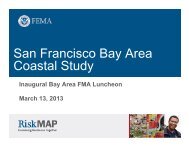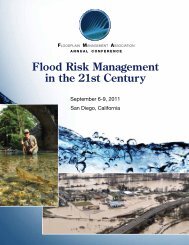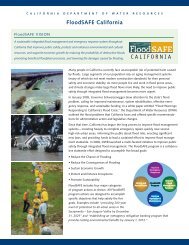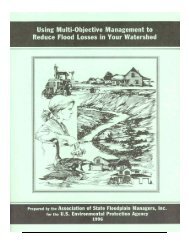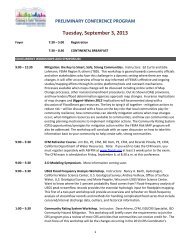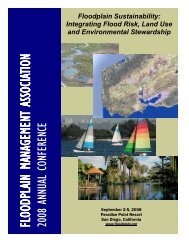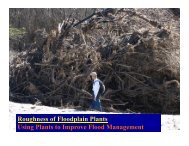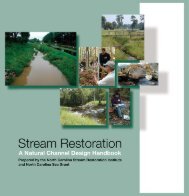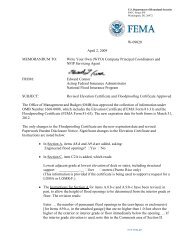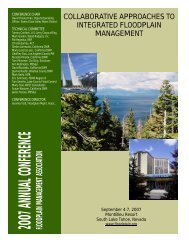Silver Jackets Quarterly Newsletter, January 2012 - Floodplain ...
Silver Jackets Quarterly Newsletter, January 2012 - Floodplain ...
Silver Jackets Quarterly Newsletter, January 2012 - Floodplain ...
You also want an ePaper? Increase the reach of your titles
YUMPU automatically turns print PDFs into web optimized ePapers that Google loves.
<strong>Silver</strong> <strong>Jackets</strong> <strong>Quarterly</strong> <strong>Newsletter</strong><br />
Don’t Let Lack of Charter Stop You:<br />
3<br />
<strong>January</strong> <strong>2012</strong><br />
Hawaii 2060: Visioning Hawaii’s Adaptation to Climate Change<br />
By Cindy Barger, USACE<br />
In August 2011, Honolulu District’s <strong>Silver</strong> <strong>Jackets</strong> initiative, the State of Hawaii‘s Coastal Zone Management Program,<br />
and the National Oceanic and Atmospheric Administration sponsored a workshop to facilitate the development of a<br />
statewide climate change policy. Sixty participants engaged in a unique futures approach to policy development.<br />
The participants represented a wide array of interests including federal, state and county agencies, academia, Native<br />
Hawaiians, environmental non-profits, community organizations, business associates, insurance companies, and youth.<br />
The workshop resulted in the development of priority guidelines for climate change adaptation being proposed by the<br />
Governor of Hawaii as an addition to the Hawaii State Planning Act in the <strong>2012</strong> State Legislative Session.<br />
"Strategies for adapting to the adverse impacts of climate change require a multi-disciplinary, integrated planning approach<br />
that takes into account other stressors such as population growth, economic realities, and Peak Oil. The futures exercise,<br />
sponsored by <strong>Silver</strong> <strong>Jackets</strong>, allowed diverse stakeholders to experience these futures together, which stimulated more<br />
comprehensive strategies to address future climate change impacts," stated Mr. Jesse Souki, Director of Hawaii’s Office<br />
of Planning and co-sponsor of the workshop.<br />
Participants were transported into the year 2060 and experienced four different scenarios based on futures archetypes of<br />
continued growth, disciplined, collapsed, and transformed societies. The participants were asked to “live” within these<br />
scenarios, accepting them as their reality and evaluating the pros and cons. Based on their experiences, they developed<br />
a “preferred future” centered on aspects of the scenarios they wished to retain or control against. This creative process<br />
encourages participants to think “outside of the box” in developing policies.<br />
Day two applied the “appreciative inquiry” process to identify the policy and actions needed to foster the “preferred<br />
future”. Participants worked together to conduct an “environmental scan” of the trends, stakeholders, contributors,<br />
and competitors that may influence the development and implementation of the “preferred future” and climate change<br />
adaptation policy. Participants developed a climate change adaption “vision” built on shared values that formed the<br />
primary basis for the final climate change policy submitted. The workshop concluded with the identification of two<br />
priority strategic issues and associated action plans: (1) Educated Public and Political Will and (2) Integrated Planning<br />
and Collaboration.<br />
Captain Jim Coon, the Maui Island representative for the Marine and Coastal Advocacy Council, stated, “This workshop<br />
was one of the most effective I have ever attended. The effort that went into creating the four different scenarios of<br />
life in 2060 paid off as we let ourselves<br />
live within the scenario. I believe that the<br />
vision that was cast was far more effective<br />
and realistic because of that effort. Finally<br />
the outcome was one that could be<br />
presented and defended to our legislators to<br />
guide them in their promulgation of climate<br />
change policy which will determine how<br />
the State of Hawaii and its people plan<br />
most effectively for climate change.”<br />
"The two-day workshop allowed leaders<br />
to develop a shared understanding of the<br />
inevitable impacts of climate change in<br />
Hawaii along with a common foundation<br />
for the future we would like to see for<br />
Hawaii's people, systems, businesses, and<br />
resources," said Mark Fox, External Affairs<br />
Director for The Nature Conservancy's<br />
Workshop participants defining shared values that will form a climate change vision statement. Hawaii Program.



